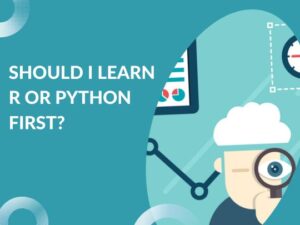Table of Contents
ToggleData science is the study of data. It’s similar to marine biology, which is the study of sea-dwelling biological life forms. The point is that data science uses statistics, scientific computing, scientific methods, processes, algorithms and systems to get insights from noisy, structured, and unstructured data. Apart from this, data science integrates domain knowledge from the underlying application domain, like natural sciences, information technology, and medicine. In this article, we will help you know how you can start studying data science. Read on to know more.
Today, data science is important as it can help understand and solve complex problems across various domains. Apart from this, it can help discover new patterns, trends, and relationships in data, create predictive models and algorithms that can guide decision-making and actions, and communicate data findings to various stakeholders.
Who is a data scientist?
A data scientist creates programming code and combines it with statistical knowledge to create insights from data. This professional uses a combination of technical skills and workplace skills to succeed in this field. They use technical skills that may include statistics and mathematics, coding in Python, R, and SQL.
Being a Data scientist is just a step away. check out the Data Science Course at 360DigiTMG and get certified today.
They work with data tools and frameworks, building data models and algorithms, and communicating data findings using data visualization and storytelling. Some of the workplace skills include open-mindedness, curiosity, persistence, teamwork, leadership, and articulation, to name a few.
How can you become a data scientist?
If you want to become a data scientist, you need to follow some steps to learn these skills and apply them to real-world problems. In this article, we will guide you through these steps to help you along the way.
Also, check this Data Science Course in Bangalore to start a career in Data Science.
Learn the basics of statistics and mathematics
The basics of statistics and mathematics refer to the concepts and tools that data scientists need to understand and analyze data. Some of the topics and concepts that data scientists need to know are listed below.
Probability:
The study of how likely an event or outcome is to occur, based on some assumptions or conditions.
Hypothesis testing:
The process of testing a claim or assumption about a population parameter using sample data.
Linear algebra:
This branch of mathematics deal with vectors, matrices, linear equations, linear transformations, vector spaces, eigenvalues, and eigenvectors, to name a few.
Wish to pursue career in data science? Enroll in the Data Science Institutes in Hyderabad to start your journey.
Calculus:
This branch of mathematics deal with limits, derivatives, integrals, and functions, among others.
Other topics:
These topics may include descriptive statistics, inferential statistics, estimation methods, maximum likelihood estimation, conditional models, and linear regression, to name a few.
Now, let’s talk about the steps you need to follow to learn data science today.
Looking forward to becoming Data scientist? check out the Data Science Training in Chennai and get certified today.
Learn How to Code in Python, R, and SQL
Coding is a primary skill for data science because it allows data scientists to perform various tasks with data, like collecting, cleaning, processing, analyzing, modeling, and communicating, to name a few. Coding also enables data scientists to automate repetitive or complex tasks, optimize performance and efficiency, and create interactive and user-friendly applications.
A brief description of each coding language
Python:
Python is a general-purpose, high-level, interpreted, and object-oriented programming language widely used for data science. The simple and elegant syntax makes it easy to read and write code.
Apart from this, Python has a rich set of libraries and frameworks that provide various functionalities for data science, such as NumPy, pandas, scikit-learn, TensorFlow, PyTorch, etc.
R:
R is a specialized, low-level, interpreted, and functional programming language. It is designed for statistical computing and graphics. R has a steep learning curve but offers powerful features for data science. R is suitable for data exploration, analysis, visualization, statistical modeling, testing, and reporting, to name a faew.
SQL:
SQL (Structured Query Language) is a domain-specific, declarative, and standardized programming language. It is generally used to interact with relational databases.
SQL allows data scientists to query, manipulate, and analyze data stored in tables using commands, like SELECT, INSERT, UPDATE, DELETE, JOIN, and so on. SQL is suitable for data extraction, transformation, aggregation, filtering, and sorting, to name a few.
Kickstart your career by enrolling in this Data Science Training in Pune .
Learn How to Work with Data
Data analysis is the process that helps get insights from data using various methods and techniques. If you want to perform data analysis, you need to collect, clean, and process data first. Here are some steps involved in this process:
Data collection:
You need to gather data from different sources relevant to your research question or problem. For instance, you can use various methods such as surveys, interviews, experiments, and web scraping to collect data.
Data cleaning:
You need to remove or fix any errors, inconsistencies, duplicates, or missing values in your data that can affect your analysis. You can use various techniques like validation, screening, diagnosing, and de-duplication to clean your data.
Data processing:
You need to transform your data into a suitable format or structure for analysis. For this purpose, you can use various tools or frameworks like pandas, numpy, scikit-learn, tidyverse, and dplyr to process your data. These tools help you manipulate, filter, aggregate, merge, reshape, or visualize your data.
After you have collected, cleaned, and processed your data, you can apply different types of data analysis like descriptive, exploratory, inferential, predictive, or prescriptive analysis to answer your research question or problem.
Learn How to Build Data Models and Algorithms
Data models and algorithms are two key components of data analysis. A data model is a representation of the structure, relationships, and patterns of the data, while an algorithm is a set of rules or instructions for performing a specific task on the data.
Types and techniques of data modeling and algorithm development
Regression:
A technique for modeling the relationship between a dependent variable (output) and one or more independent variables (inputs). Regression can be used for prediction, estimation, or hypothesis testing. Examples of regression algorithms are linear regression, logistic regression, and polynomial regression.
Classification:
A technique for assigning a label or category to an instance based on its features or attributes. Classification can be used for identification, diagnosis, or recommendation. Some examples of classification algorithms are k-nearest neighbors, decision trees, support vector machines, and neural networks.
Clustering:
A technique for grouping instances based on their similarity or dissimilarity. Clustering can be used for segmentation, summarization, or anomaly detection. Examples of clustering algorithms are k-means, hierarchical clustering, and DBSCAN, to name a few
Decision trees:
A technique for creating a tree-like structure that represents a series of decisions and their outcomes. Decision trees can be used for classification, regression, or rule extraction. Examples of decision tree algorithms are ID3, C4.5, and CART.
Long story short, you can follow this article if you want to start studying data science to become a professional in this field.
Data Science Training Institutes in Other Locations
Tirunelveli, Kothrud, Ahmedabad, Hebbal, Chengalpattu, Borivali, Udaipur, Trichur, Tiruchchirappalli, Srinagar, Ludhiana, Shimoga, Shimla, Siliguri, Rourkela, Roorkee, Pondicherry, Rajkot, Ranchi, Rohtak, Pimpri, Moradabad, Mohali, Meerut, Madurai, Kolhapur, Khammam, Jodhpur, Jamshedpur, Jammu, Jalandhar, Jabalpur, Gandhinagar, Ghaziabad, Gorakhpur, Gwalior, Ernakulam, Erode, Durgapur, Dombivli, Dehradun, Cochin, Bhubaneswar, Bhopal, Anantapur, Anand, Amritsar, Agra , Kharadi, Calicut, Yelahanka, Salem, Thane, Andhra Pradesh, Greater Warangal, Kompally, Mumbai, Anna Nagar, ECIL, Guduvanchery, Kalaburagi, Porur, Chromepet, Kochi, Kolkata, Indore, Navi Mumbai, Raipur, Coimbatore, Bhilai, Dilsukhnagar, Thoraipakkam, Uppal, Vijayawada, Vizag, Gurgaon, Bangalore, Surat, Kanpur, Chennai, Aurangabad, Hoodi,Noida, Trichy, Mangalore, Mysore, Delhi NCR, Chandigarh, Guwahati, Guntur, Varanasi, Faridabad, Thiruvananthapuram, Nashik, Patna, Lucknow, Nagpur, Vadodara, Jaipur, Hyderabad, Pune, Kalyan.
Data Analyst Courses In Other Locations
Tirunelveli, Kothrud, Ahmedabad, Chengalpattu, Borivali, Udaipur, Trichur, Tiruchchirappalli, Srinagar, Ludhiana, Shimoga, Shimla, Siliguri, Rourkela, Roorkee, Pondicherry, Rohtak, Ranchi, Rajkot, Pimpri, Moradabad, Mohali, Meerut, Madurai, Kolhapur, Khammam, Jodhpur, Jamshedpur, Jammu, Jalandhar, Jabalpur, Gwalior, Gorakhpur, Ghaziabad, Gandhinagar, Erode, Ernakulam, Durgapur, Dombivli, Dehradun, Bhubaneswar, Cochin, Bhopal, Anantapur, Anand, Amritsar, Agra, Kharadi, Calicut, Yelahanka, Salem, Thane, Andhra Pradesh, Warangal, Kompally, Mumbai, Anna Nagar, Dilsukhnagar, ECIL, Chromepet, Thoraipakkam, Uppal, Bhilai, Guduvanchery, Indore, Kalaburagi, Kochi, Navi Mumbai, Porur, Raipur, Vijayawada, Vizag, Surat, Kanpur, Aurangabad, Trichy, Mangalore, Mysore, Chandigarh, Guwahati, Guntur, Varanasi, Faridabad, Thiruvananthapuram, Nashik, Patna, Lucknow, Nagpur, Vadodara, Jaipur, Hyderabad, Pune, Kalyan, Delhi, Kolkata, Noida, Chennai, Bangalore, Gurgaon, Coimbatore.
Navigate To:
360DigiTMG – Data Analytics, Data Science Course Training Hyderabad
2-56/2/19, 3rd floor,, Vijaya towers, near Meridian school,, Ayyappa Society Rd, Madhapur,, Hyderabad, Telangana 500081
Contact Number: +91-9989994319/1800-212-654321
Source Link:What are the Best IT Companies in Hyderabad
Source Link:Data Science Training in Hyderabad Gachibowli




